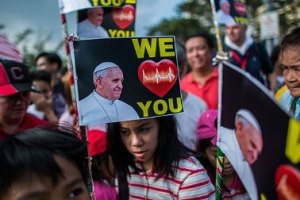Readings for 3rd Sunday in ordinary time: DT 18: 15-20; PS 95: 1-2, 6-9; I COR 7: 32-35; MK 1: 21-28
Today’s readings are about resistance to oppression. They invite us to side with the oppressed and poor in their fight against world-class bullies – to understand the world from the viewpoint of the “unclean.” Seen from that perspective, “American Sniper” is full of insight. It calls us to think critically about whose side we are on in the endless wars our country wages.
The need to see reality “from below” is a major point of today’s first reading. There the message of Moses announcing liberation of the oppressed is presented as the criterion of prophetic truth. Those who teach like Moses (on behalf of the enslaved) should be listened to. False prophets with another message will be punished. This first reading from the Jewish tradition goes on to promise the advent of another prophet like Moses.
By virtue of its inclusion in the liturgy of the word, today’s gospel selection from the Christian tradition identifies Jesus as fulfilling the Mosaic promise. He not only astounds people by his authoritative way of speaking. His action on behalf of a man considered “unclean” demonstrates Jesus’ prophetic authenticity.
That insight was on my mind last week when I decided to see “American Sniper” for myself. I had read the reviews. I knew the criticisms. But I wondered what it would look like if I followed the suggestions of today’s readings and viewed the film “from below,” from an Iraqi perspective.
What I discovered was surprising.
Viewed from the underside of history, “American Sniper” was a tribute to the world’s poor and oppressed – especially to the heroic people of Iraq. That’s because “American Sniper” was about resisting bullies the way the Iraqis have since 2003.
That bully theme is not farfetched. It was announced in one of the film’s opening scenes.
There an adolescent Chris Kyle is instructed by his father about three ways of being in the world. Kyle, of course, is the film’s central character – the most lethal sniper in the history of the American military. He is believed to have killed 255 Iraqis in his 4 tours of duty. Many, it is certain, had their heads blown right off.
“You can be a wolf, a sheep, or a sheepdog” Kyle’s father tells him (in my paraphrase). “Wolves are bullies; they are cowards preying on the weak. Sheep are the naïve who simply go along, following the herd; they do nothing about bullies. They too are cowards. The way to deal with bullies” says Kyle’s father,” is to be a sheepdog and protect those the bully preys upon.
“I want you to be sheepdogs!” the elder Kyle shouts at his sons, “Don’t let the bullies have their way.”
Ironically, the rest of “American Sniper” shows how Chris Kyle entirely rejected his father’s advice, but also how Iraqi patriots unconsciously heeded it. They emerge in the film as the sheepdogs Kyle’s father admired.
For his part, Kyle joins a gang that specifically preys upon the weak for no good reason – simply because it can and because (as Kyle writes) it’s fun. Chris Kyle became a gangster bully.
No, he didn’t join the “Crips” or “Bloods,” “Sharks” or “Jets.” He joined the “Seals.” And their destructive power was beyond belief. To begin with, their gang attire was fearful including matching helmets and boots, flak jackets, camouflage, wrap-around sunglasses, and night vision goggles. They had guns of all types, unlimited supplies of bullets, grenades, missile launchers, armored vehicles, helicopters, planes, and sophisticated communication devices. They prowled in menacing groups along the streets of Bagdad pointing guns at open windows and doors, pedestrians and drivers.
But it wasn’t easy for aspiring bullies to become Seals; doing so required absolute submission and humiliation. So as with all gangs, they had their initiation rites. These included merciless hazing and demeaning tests of endurance. Such rites of passage were accompanied by constant indoctrination that left initiates exhausted and absolutely malleable. In terms of today’s responsorial psalm, their hearts were sufficiently hardened for the inhuman tasks before them.
As a result, and with no knowledge whatever of their intended victims, Seals became convinced that anyone their superiors identified as “targets” were savages. They knew that because their indoctrinators told them so. They knew nothing else about Iraq, Iraqis or their culture. And so, and like their Indian Fighter predecessors, Seals hated “savages” and wanted them all dead.
In other words, gang aspirants became servile and submissive sheep. They obeyed orders without question or understanding of context. (It’s the military way.) Seals stood ready to kill women, children, the elderly and disabled – anyone identified by their superiors or who threatened their mafia-like ethos of “family.” Protecting one’s “brothers” in crime became the justification of any slaughter. As a result of that brainwashing, Seals were entirely unable to see their “enemies” human beings.
Such identification was difficult for audiences of “American Sniper” as well. Nonetheless, Iraqi humanity inevitably surfaced for anyone remembering today’s readings about Moses and Jesus. Those prophetic lenses revealed the Seals’ victims to be the successors of the poor and oppressed that both of those prophets came to rescue.
Think about the Iraqis for a minute.
Like their predecessors in Egypt, they were perfect targets for bullies. They had no army, no sophisticated weapons, no helicopters, planes or armored vehicles. They wore no uniforms or protective clothing. Apart from unemployed members of Iraq’s Republican Guard, almost none had formal military training.
Instead they were simple peasants, merchants, teachers, barbers and taxi drivers. They were fathers and mothers, children barely able to lift a grenade launcher, grandparents, friends and neighbors banding together as best they could to protect their homes, families from the ignorant, marauding invaders who proudly called themselves “The Seals.” Unable to show weapons in public (like their menacing occupiers), Iraqis hid them by day under floor boards in their homes.
Some were so desperate that they were willing to sacrifice themselves and their children to resist the Seal home-invaders. So they became suicide bombers. Others experimented with non-violent resistance. They were willing to share their tables with the barbarians from abroad, offering them food and shelter in hopes that kindness might win them over.
But no such luck.
So the majority resorted to defending themselves and each other with weapons – mostly captured or left over from previous Seal invasions (there have been many). What else were these brave patriots to do?
One of them became particularly admired. He had been a national hero, called Mustafa. In the story, this fictional character was an Olympic gold medal winner like the American’s Michael Phelps. But instead of resting on his laurels or using his status to protect himself from harm, he employed his skills as a sharp shooter to defend his people.
We can only imagine the pride that swelled the hearts of Iraqis when they heard how he inspired fear in the American bullies who constantly kicked in their doors, destroyed and looted their property, belittled their culture and faith, intimidated their children, frightened their elders, and demeaned their women.
In the end, Mustafa became a glorious martyr.
Again ironically, he was gunned down by his ignorant American counterpart. He was killed by the bully without a thought in his head who was in the game for fun, for the rush of battle, and to protect his relatively invulnerable “brothers” from the harm they deserved at the hands of the civilian victims they tormented.
In what can only be described as an act of self-loathing, that counterpart, Chris Kyle, takes careful aim and from a great and safe distance shoots a patriot he considers “savage,” because he mirrors so well his own bloody “work.”
It’s easy to vilify Chris Kyle. But he’s not to blame. He was no different from any other soldier serving in Iraq. He was no different from drone “pilots” operating from their air-conditioned “theaters” in Nevada or New Mexico. Sad to say, all of them are unwitting bullies and gangsters. They are brainwashed sheep.
Today’s readings are a reminder of all that. So is “American Sniper.”
Both call us to put ourselves in the shoes of those we are taught to hate.
Shockingly, they call us to change sides!






